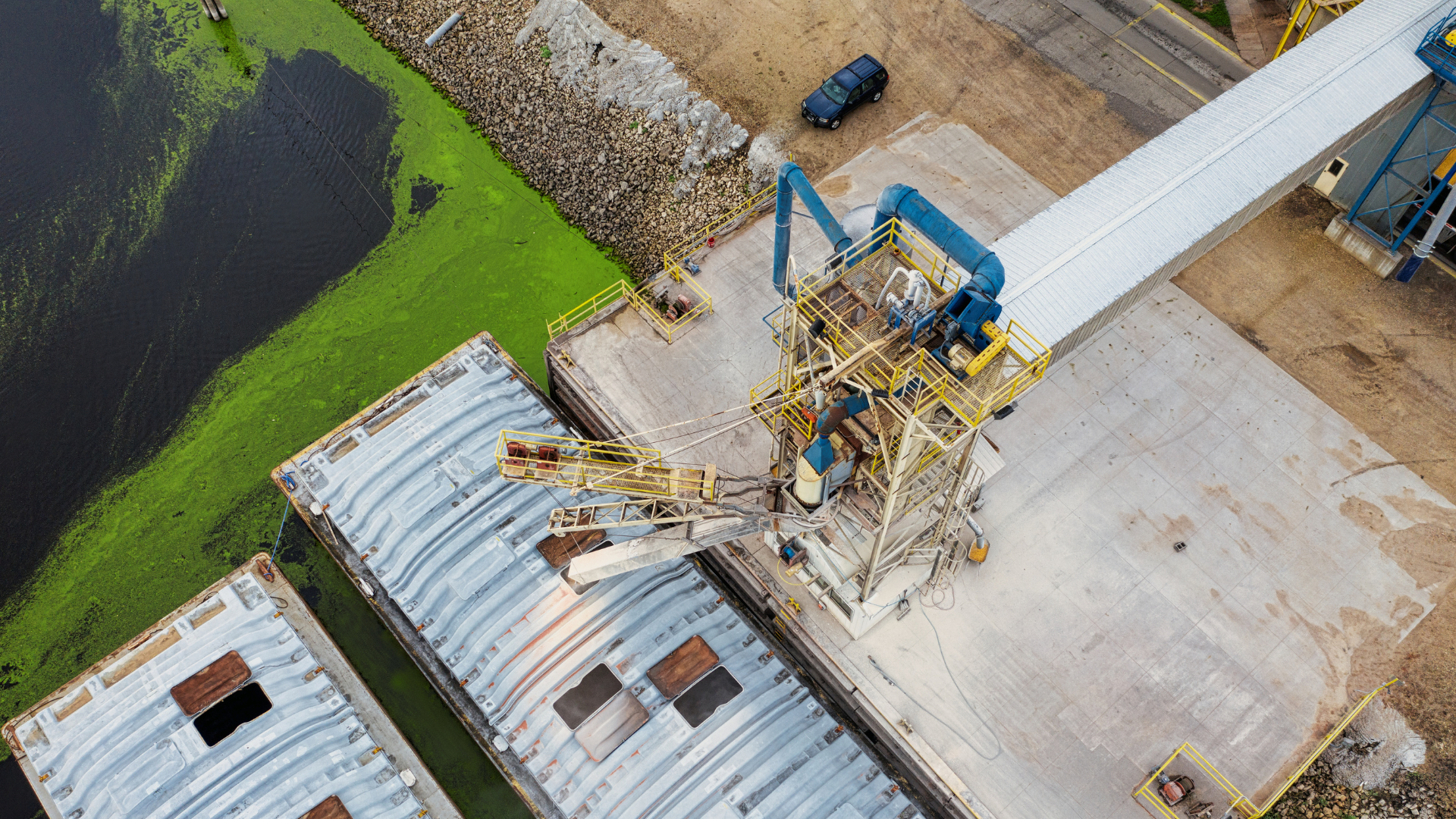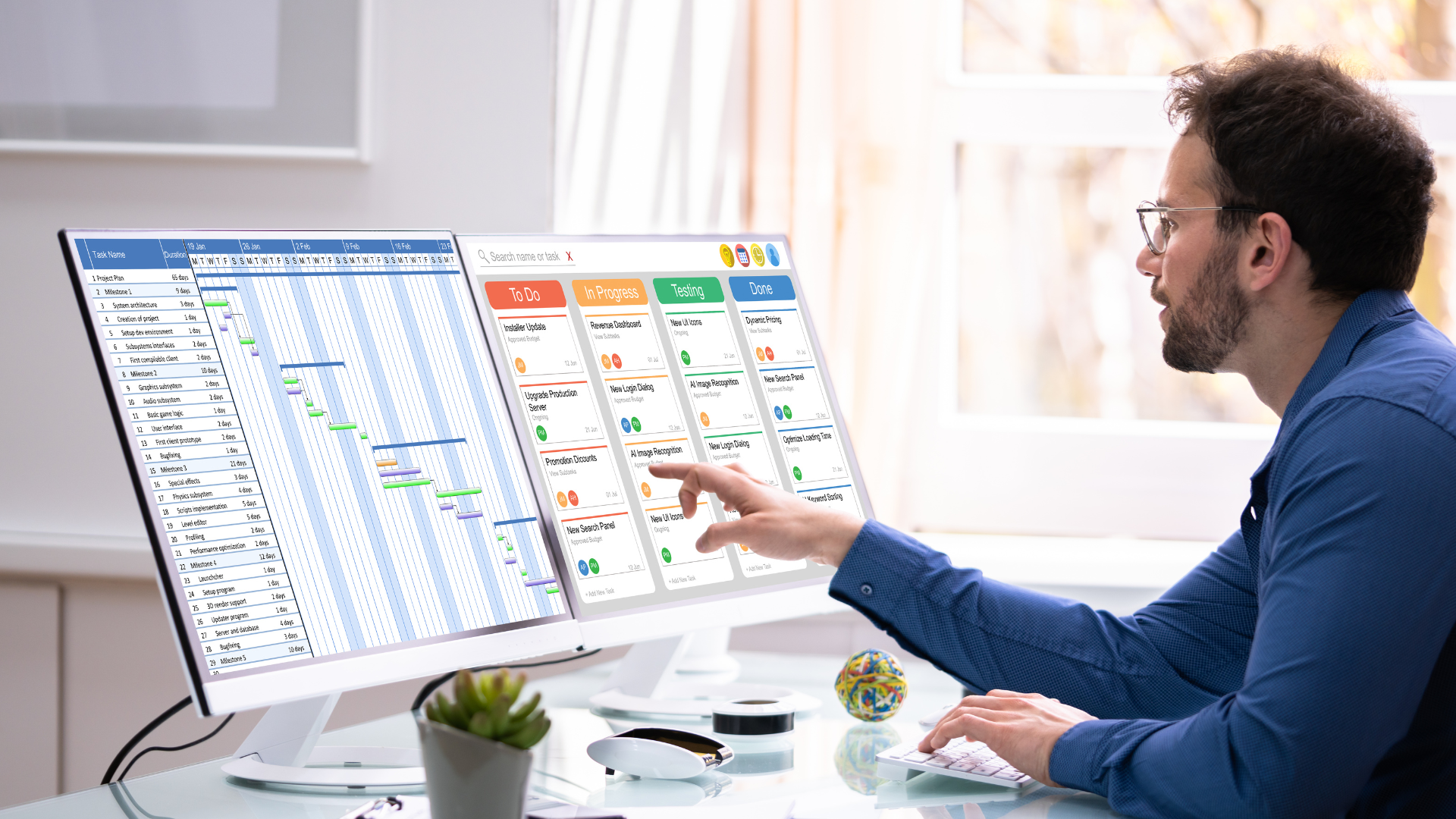The construction industry in 2025 isn’t what it was five years ago, or even last year. General contractors are expected to juggle more than just blueprints and building codes.
There's barely time to breathe between managing client expectations, tracking job progress, and closing new deals.
You're not alone if you’ve ever felt overwhelmed by sticky notes, scattered spreadsheets, and never-ending emails.
This is precisely why a Construction CRM (Customer Relationship Management) tool has become essential rather than a luxury.
In 2025, tools like Constructionbase are transforming the landscape for general contractors aiming to remain competitive, organized, and profitable, while providing exceptional customer interactions.
Key Takeaways
- Understand the role of CRM in the modern construction landscape.
- Discover features tailored for contractors, builders, and project managers.
- Learn how Construction CRMs improve efficiency, reduce errors, and boost revenue.
- See why software like Constructionbase is becoming a non-negotiable tool for GCs.
What is a Construction CRM?
A Construction CRM software is designed for contractors, builders, and construction professionals to manage relationships, leads, and project management.
Unlike generic CRM platforms, a construction CRM integrates everything from client communication to project timelines and billing and is tailored for the industry's unique needs.
Why Construction Companies Need a CRM Today More Than Ever
Construction isn’t just about what happens on-site. It’s about your client's entire experience from the very first conversation to long after the final brick is laid.
A CRM ensures no details fall through the cracks.
Let’s break it down:
1. Projects Are More Complex and Time-Sensitive
Gone are the days when construction project timelines were flexible and expectations were loose.
Now, every project has dozens of moving parts: permits, subcontractors, construction contractors, client meetings, supply delays, and they all need to be tracked and managed precisely.
If you still rely on spreadsheets or paper files, losing track of a key document or deadline is way too easy.
A CRM gives you the structure and visibility you need.
You can see the full picture of each job at a glance: what’s done, what’s behind, who’s responsible, so nothing falls through the cracks.
It helps your team move faster and smarter, positively impacting client relationships, keeping clients happy, and keeping timelines on track.
2. Clients Expect Faster Updates and Better Communication
Today’s clients don’t want to chase you for updates. They expect transparency and responsiveness.
If you can’t provide clear answers quickly, like when a job will finish or what a change order costs, they’ll start to question your professionalism.
With a CRM, every client interaction, email, and change request is logged in one place.
That means when a client calls, you don’t have to dig through notes or call your site lead; you already have the answer.
It helps you build trust, deliver on promises, and make clients feel taken care of at every step.
3. Competition Is Growing, and Efficiency Is the Key to Standing Out
There are more contractors and construction companies than ever.
So, how do you stand out?
It’s not just about pricing or flashy brochures. It’s about how easy you are to work with.
If your process is clunky, clients notice. If your team doesn’t communicate well, it shows.
But if you have a streamlined, professional system that keeps everything running smoothly, particularly in sales management, bids, timelines, payments, updates, that’s what makes you memorable.
A CRM becomes your competitive edge. It helps you work smarter, respond faster, and stay more organized than the next guy bidding for the same job.
In short, a CRM isn’t just another tool. It’s your behind-the-scenes partner. It doesn’t build walls or pour concrete, but it makes sure your team is in sync, your clients are informed, and your business runs well.
Key Features That Make a Construction CRM Worth It
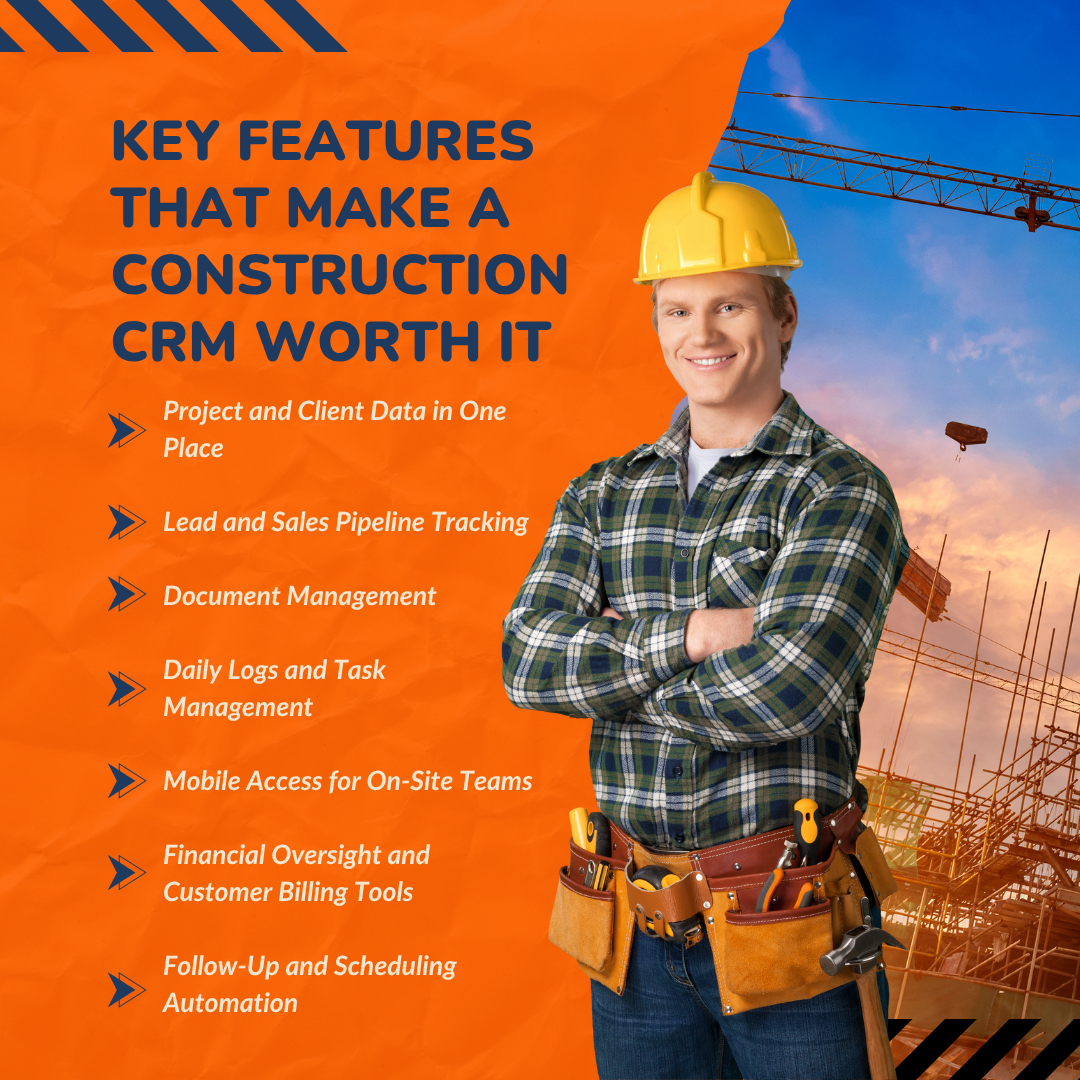
1. Project and Client Data in One Place
Having a centralized system helps eliminate silos. From customer portal info to job specs, everything is accessible in one place.
2. Lead and Sales Pipeline Tracking
Visual pipelines show where each lead stands and what steps are needed to close the deal.
3. Document Management
Blueprints, contracts, and change orders can all be stored and accessed securely within the platform.
4. Daily Logs and Task Management
Team members can log job-site progress and manage their tasks without needing separate tools.
5. Mobile Access for On-Site Teams
Stay connected and update project details in real-time, no matter where your crew is.
6. Financial Oversight and Customer Billing Tools
Track expenses, manage invoices, and stay on top of client payments from the same dashboard.
7. Follow-Up and Scheduling Automation
Never miss a follow-up. Automate reminders and appointment scheduling to stay organized.
8. Drag-and-Drop Project Planning
Adjust tasks and timelines with simple drag-and-drop functionality that makes scheduling intuitive.
9. Real-Time Updates and Progress Tracking
Everyone, from the sales team to project managers, gets instant updates on job status and next steps.
Also read: Ultimate Guide to Choosing the Best Construction Management Software
How a CRM Helps General Contractors Work Smarter
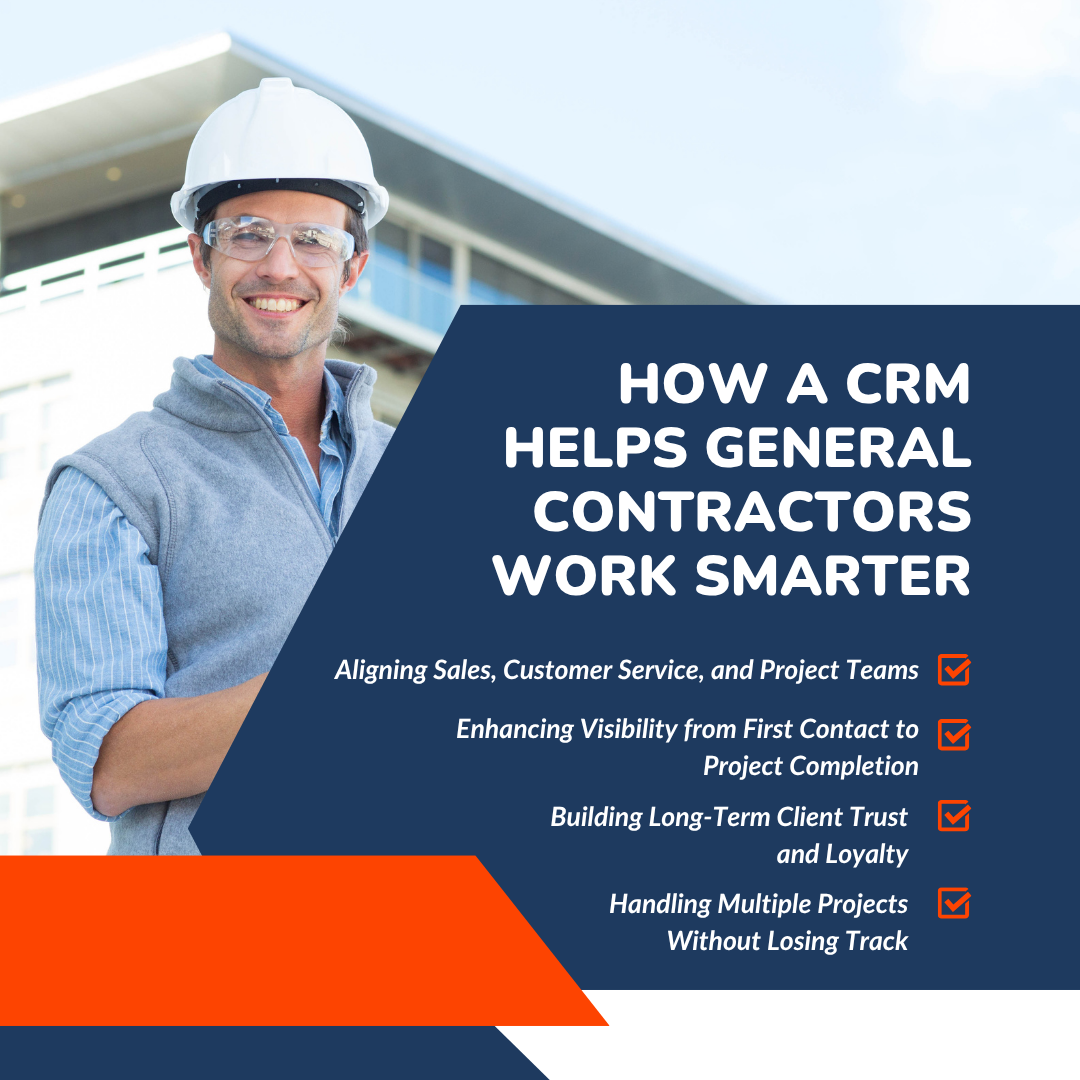
Let’s be real: most general contractors didn’t get into this business to sit behind a desk chasing paperwork, replying to endless email threads, or tracking down missing updates.
They got into construction to build, to lead crews, deliver quality projects, and create something real. But somewhere along the way, the paperwork, delays, and communication breakdowns started eating up their day. That’s where a Construction CRM changes the game for construction firms.
Think of it as your central nervous system.
A good CRM doesn’t just store information; it connects people, processes, and progress across every stage of the project.
Whether it’s sales, customer service, or project execution, everyone operates from a single source of truth. That alone can feel like taking a deep breath after running a marathon.
It helps you:
1. Aligning Sales, Customer Service, and Project Teams
Ever had a client call with a question and no one on your team knows who last spoke to them or what was promised, and missed the project tracking?
That’s what happens when departments work in silos. Your sales team may close the deal, but if they don’t pass on every detail to the project manager or customer service rep, things fall apart, and clients get frustrated.
With a CRM, customer management is enhanced, and everyone, including salespeople, project managers, and office staff, has access to the same information.
The client’s needs, budget, sales performance, and expectations are all in one place.
This creates a smooth hand-off from initial inquiry to project delivery. No more guesswork, no more “Let me get back to you,” just seamless service.
2. Enhancing Visibility from First Contact to Project Completion
Construction jobs can get messy, literally and figuratively. Between bids, permits, approvals, supplier updates, and client requests, it’s easy to lose track of a project's progress.
A CRM gives you a bird’s-eye view of every project’s progress.
You can instantly see what stage it's in, who’s handling what, and what tasks are still pending.
It’s like having a live dashboard of your entire business, right in your pocket. That means you spend less time putting out fires and more time making sure each project is running smoothly.
3. Building Long-Term Client Trust and Loyalty
In construction, relationships matter. A client who trusts you will call you again and refer you to others. But with so many moving parts and different clients, keeping that personal touch can be tough.
A CRM helps you stay connected, even during your busiest seasons.
It reminds you of follow-ups, birthdays, or even to check in after a job is done.
You can log client preferences, past issues, and feedback, so every interaction feels thoughtful, streamlines processes, and is not robotic.
That kind of attention to detail shows clients that you care about them as well as the project.
4. Handling Multiple Projects Without Losing Track
Managing two or three projects at once turns into ten or fifteen as your business grows. Without the right system, growth can feel more chaotic.
A CRM brings order to the madness.
It helps you schedule, delegate, track progress, and communicate, without missing a beat. Whether managing a minor renovation or a large commercial build, you know exactly what’s happening at every site, with every team, and for every client.
You can scale up without compromising on quality or control.
A CRM doesn’t replace your experience or instincts; it supercharges them.
It gives you the tools to be more responsive, efficient, and connected so you can focus on what really matters: delivering excellent work and growing your business.
Signs Your Construction Business Needs a CRM
- You’re struggling to track leads or client communication
- Follow-ups are missed, and potential deals fall through
- You rely on multiple disconnected tools (or worse, paper!)
- Your teams are often out of sync
- You waste time entering the same data with different CRM features in different systems.
Choosing the Right CRM for Your Construction Business
What to Look For
- Construction-specific features for a specific business
- Scalability as your business grows
- Reliable customer support
General CRMs vs. Construction-Focused CRMs
- Generic CRMs may offer flexibility, but they often lack the tools you actually need on a job site.
- Construction-focused tools like Constructionbase understand your pain points and workflows.
Questions to Ask Before Buying
- Can it track leads, jobs, and communication in one place?
- Is it mobile-friendly for on-site use?
- Does it integrate with tools you're already using?
Real Benefits: What You Can Expect After Implementation
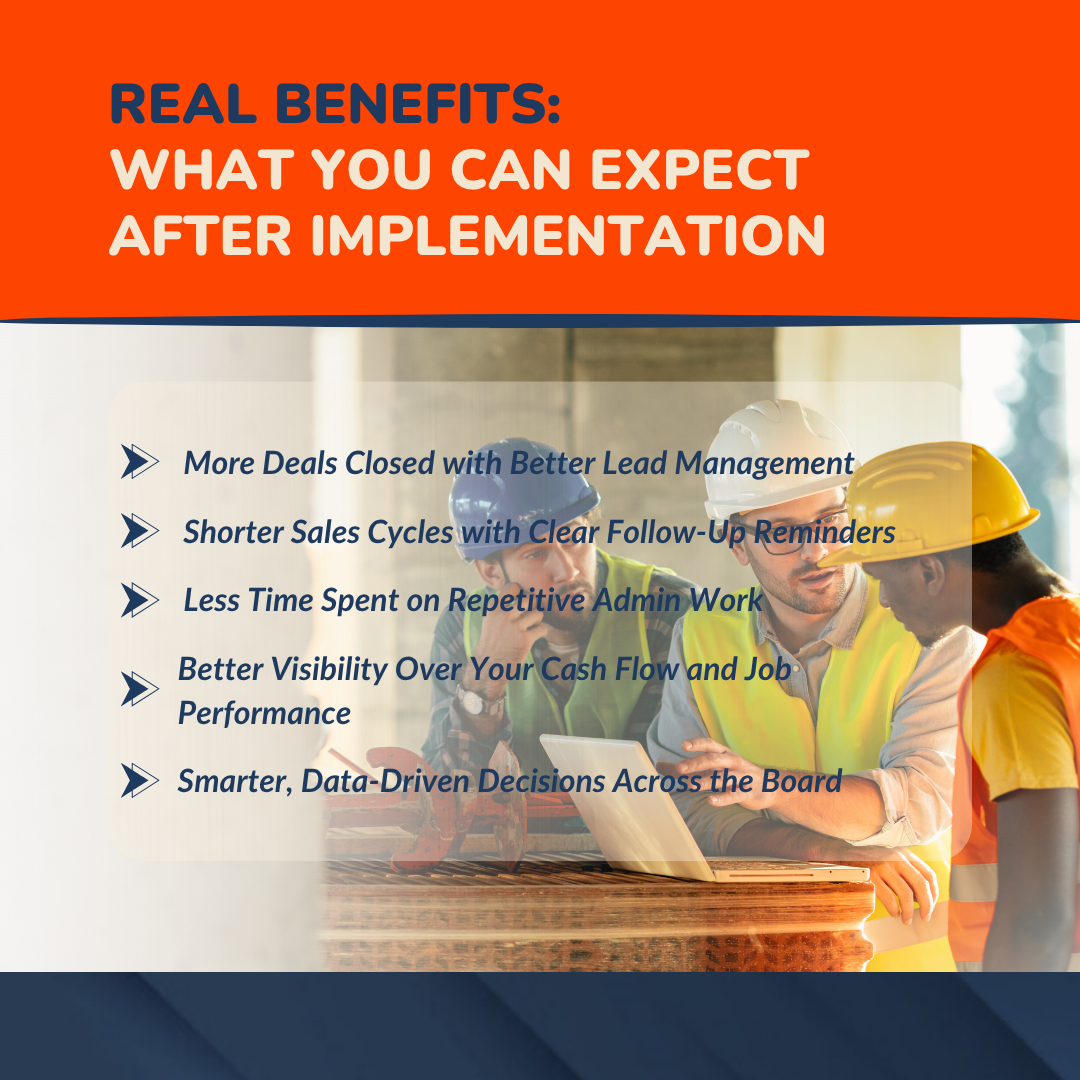
You don’t need more software, you need better results. A CRM isn’t just a fancy tool; it’s a practical solution that saves time, reduces stress, and helps you close
more deals with fewer headaches.
Here’s how it actually helps once it’s up and running:
1. More Deals Closed with Better Lead Management
Ever forgotten to follow up with a potential client, and found out later they went with someone else?
With a CRM, you won’t lose leads because you're too busy.
Every new inquiry gets logged automatically. You can track where each lead came from, when to follow up, and their interest.
No more sticky notes or missed calls, just a steady pipeline of opportunities that actually get closed.
You’ll start noticing that your win rate improves because every lead is followed up at the right time, with the right message.
2. Shorter Sales Cycles with Clear Follow-Up Reminders
In construction, delays can happen, but your sales process shouldn’t be one of them.
A CRM helps you move deals forward faster.
It sends you reminders to follow up, nudges you when a quote hasn’t been responded to, and keeps you organized during the back-and-forth.
That means fewer deals go cold, and you spend less time chasing paperwork and more time winning jobs.
Clients also feel more confident because you’re always one step ahead and ready with answers.
3. Less Time Spent on Repetitive Admin Work
Let’s be honest, nobody started a construction business because they love data entry.
A CRM reduces the time you spend doing repetitive tasks like sending emails, updating spreadsheets, or manual data entry while tracking job details.
You can automate follow-up emails, schedule reminders, and generate reports in a few clicks.
That means your evenings aren’t filled with paperwork, and your team spends more time on actual work, not admin.
4. Better Visibility Over Your Cash Flow and Job Performance
When you’re managing multiple projects and teams, it’s easy to lose track of the big picture, especially when invoices, deadlines, and change orders pile up.
A CRM gives you real-time insights into your pipeline and financial management, along with cash flow.
You can see which jobs are progressing well, which ones need attention, and when payments are due. It helps you catch red flags early, before they turn into costly mistakes.
You get to stay in control without micro-managing every single task.
5. Smarter, Data-Driven Decisions Across the Board
You know your business, but imagine if you had data to back up your gut instincts.
A CRM tracks your most profitable projects, your busiest seasons, and even which team members close the most deals.
You can identify patterns, spot bottlenecks, and make decisions based on real numbers, not just guesswork.
That kind of clarity helps you grow smarter, not just bigger.
After implementing a CRM, you’ll spend less time reacting and more time leading.
Your processes become smoother, your clients happier, and your business more profitable.
Check out this blog about Training Your Team to Maximize Construction CRM Benefits
Top 5 Reasons Every General Contractor Needs a Construction CRM Like Constructionbase in 2025
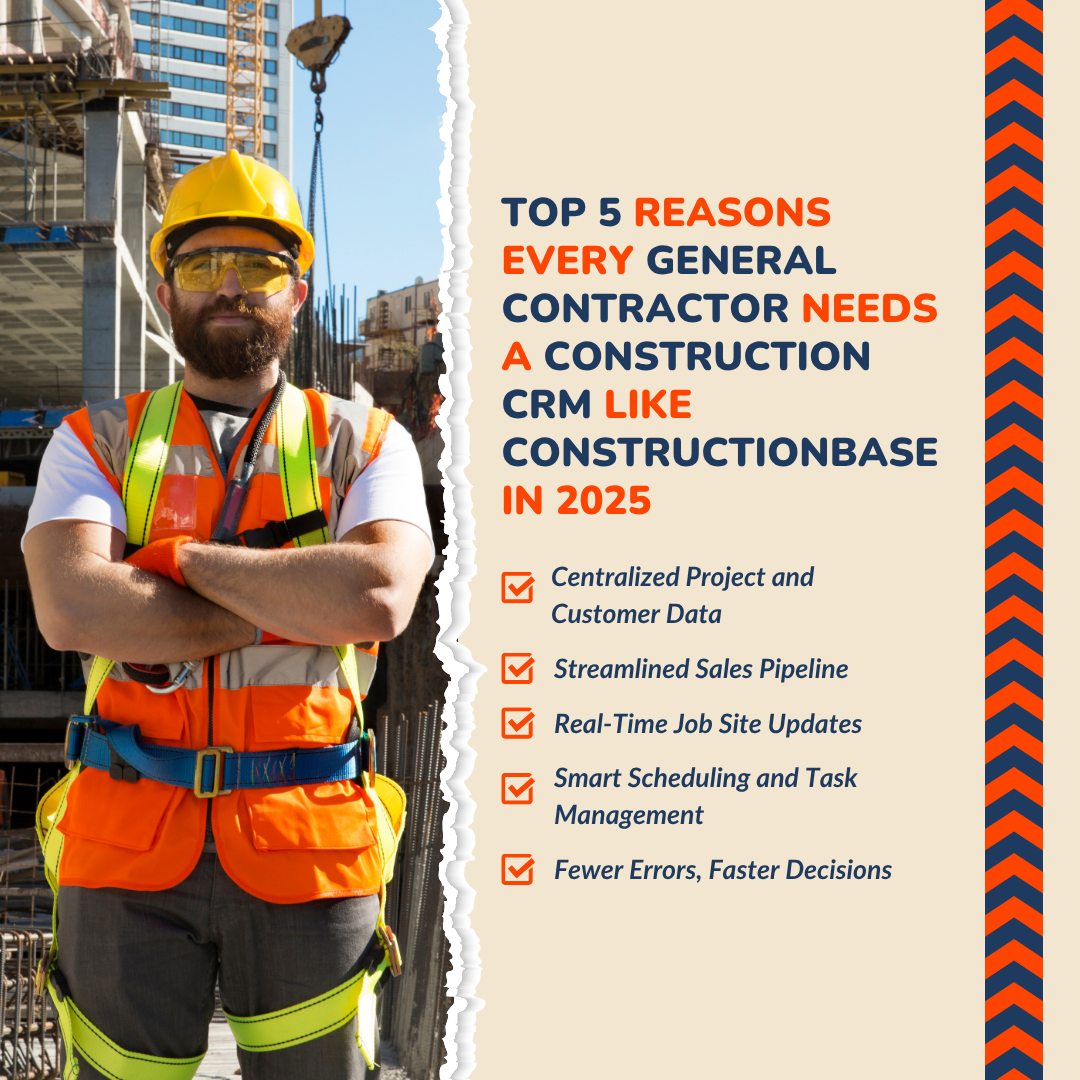
1. Centralized Project and Customer Data
No more digging through emails, texts, or scattered spreadsheets.
Store everything, from client contact details to blueprints, quotes, and contracts, in one secure, organized platform.
Everyone has access to the same, up-to-date info, saving time and confusion.
2. Streamlined Sales Pipeline
Easily track every job opportunity from the first inquiry to the signed agreement.
With visual pipelines and automated reminders, your sales process becomes smoother, and no lead gets forgotten or delayed.
3. Real-Time Job Site Updates
Field teams can instantly upload photos, mark completed tasks, and report problems straight from the job site.
This keeps the office and stakeholders informed, reduces back-and-forth, and speeds up issue resolution.
4. Smart Scheduling and Task Management
Assign tasks with a simple drag-and-drop calendar, shift schedules when delays occur, and keep everyone aligned.
No more last-minute surprises or miscommunication between teams.
5. Fewer Errors, Faster Decisions
With all data available in real time, job costs, schedules, and team performance, you can make decisions faster and with more confidence.
That means fewer costly errors and better outcomes on every project.
Must read: Revolutionize Your Projects with Construction Software
Conclusion
A construction CRM like Constructionbase is more than just a tech upgrade. It’s a business partner that helps you win more jobs, stay organized, and deliver better results.
If you’re ready to stop juggling and start building smarter, now’s the time to make the switch.
About Constructionbase
Ready to bring order to your chaos?
Explore how Constructionbase can streamline your operations and help you focus on what you do best: building.
FAQs
Q: Is a CRM only useful for large construction companies?
A: Not at all. Small and mid-sized contractors often see the biggest impact, as it helps them grow without losing control.
Q: How long does it take to implement a Construction CRM like Constructionbase?
A: Most companies are up and running within a few days, with full support provided.
Q: Can I use it on mobile at job sites?
A: Yes. Constructionbase is designed for mobile use, so your field crew can stay connected anywhere.
Q: Will it help me track billing and expenses, too?
A: Absolutely. Financial oversight is a core part of the platform.
Have questions or need personalized advice?
Talk to an Expert Today and let our construction specialists guide you to success.


